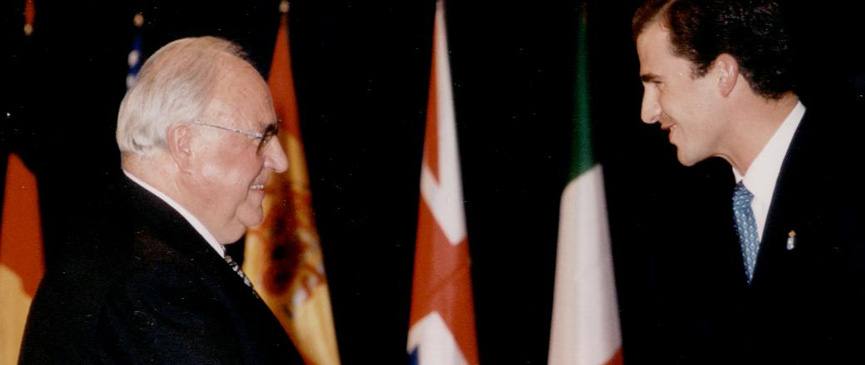The Princess of Asturias Foundation
Sección de idiomas
Fin de la sección de idiomas
Sección de utilidades
Fin de la sección de utilidades
- The Foundation
- HM The King
- HRH The Princess of Asturias
- 2023 Special
- Princess of Asturias Awards
- Area of Communication and Media
- Music Department
- Exemplary Town of Asturias Award
- 2012 Special
- 2013 Special
- 2014 Special
- 2015 Special
- 2016 Special
- 2017 Special
- 2018 Special
- 2019 Special
- 2020 Special
- 2021 Special
- 2022 Special
-
Important: COVID-19
-
Terms of Use
You are in:
Laureates
Start of main content
Helmut Kohl
Prince of Asturias Award for International Cooperation 1996

Helmut Kohl (Ludwigshafen, Germany, 1930 - Ludwigshafen, Germany, 2017), the Chancellor -head of Government- of Germany since 1982 until 1998, was graduated in Law, Political Science and History, he started his political career as the leader of the christian-democratic youth in 1954. He was the president of the parliamentary group of the Christian-Social Union from 1976 until 1982, when, after a crisis in Helmut Schmidt's Social-Democrat government, he proposed a motion of censure which allowed him to reach the Chancery, a position in which he became more firmly established in 1983 after the elections.
He was prominent in the eighties with his efforts to reduce conventional weapons and destroy medium-range missiles in Europe, also giving priority to the evolution of the relationships between Western and Eastern-European countries, and the progression of the European Community towards the Single Market. At the end of the eighties, Kohl made his aim the unification of Germany. This was accomplished at the end of 1989 with the fall of the Berlin Wall on the night of the 9th of November. Kohl then launched his "Ten-point plan" in order to achieve "real German unity".
This unity posed a difficult international situation which obliged Helmut Kohl to concentrate his efforts on convincing the USSR and the rest of the World War II winning powers that the new Germany did not represent a threat to Europe. The fruit of this work was the support of Mikail Gorbachov in the unification process and also the acceptance of the possible admission of the new Germany into NATO. Having overcome the opposition of the allied powers, in September of 1990 the "Unification of Germany Treaty" came into force and in August of 1992, through the "Treaty of Capitalization", Germany reclaimed Berlin as the capital of the State. Since then, Helmut Kohl has continued to work from his position of Chancellor trying to make unification a reality and to make the inequalities between East and West Germany fade away into a non-traumatic process. At the same time, on the international front, he is a decisive driving force in the European political and monetary union, questions which are a constant concern for this statesman to whom has fallen, without a doubt, a significant role in the shape of late twentieth century Europe.
End of main content
Sección de utilidades
Fin de la sección de utilidades
- Legal document Legal document (Access key 8)
- | Privacy policy Privacy policy (Access key )
- | Social networks ???en.portal.pie.menu107.title???
- | Cookies ???en.portal.pie.menu110.title???
- | Site map Site Map (Access key 3)
- | Contact Contact (Access key )
- | XHTML 1.0
- | CSS 2.1
- | WAI 'AA
© Copyright 2024. FUNDACIÓN PRINCESA DE ASTURIAS



